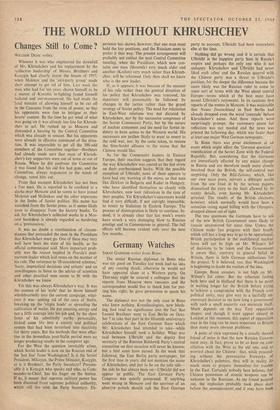THE WORLD WITHOUT KHRUSHCHEV
Changes Still to Come?
WILLIAM DEAN writes: Whoever it was who engineered the downfall a Mr. Khrushchev and his replacement by the 'collective leadership' of Messrs. Brezhnev and Kosygin had clearly learnt the lesson of 1957, when Molotov and the 'anti-party group' made their attempt to get rid of him. Last week the man who had for ten years shown himself to be a master of Kremlin in-fighting found himself isolated and out-manoeuvred. He had made the 'fatal mistake of allowing himself to be cut off in the Caucasus from the reins of power, so that his opponents were free to intrigue to their hearts' content. By the time he got wind of what was going on it was already too late for Khrush- chev to act. He rushed up to Moscow and demanded a hearing by the Central Committee which was already in session. But his opponents were already in effective command of the situa- tion. It was impossible to get all the 300-odd members of the Committee together—Brezhnev had already made sure that most of Khrush- chev's key supporters were out of town or out of Russia. When he did confront the Committee it was found that his old fire had gone, and the Committee, always responsive to the winds of change, voted him out.
From that moment Khrushchev has not been a free man. He is reported to be confined to a dacha near Moscow and he seems to have joined
• Molotov and Malenkov and the other unpersons in the limbo of Soviet politics. His name has vanished from the Soviet press, as it seems likely soon to disappear from the history books. To ask for Khrushchev's collected works in a Mos- cow, bookshop is already regarded as bordering on a 'provocation,'
It was no doubt a combination of circum- stances that persuaded the men in the Presidium that Khrushchev must go. One of these may very well have been the state of his health, as the official communique said. More important prob- ably was the reason implied in Pravda's post- mortem leader which laid stress on the manner of his rule. The reference to 'ill-considered schemes,' 'hasty, impractical decisions and actions' and an unwillingness to listen to the advice of scientists and other practical men seems to fit with the Khrushchev we know.
Yet this was always Khrushchev's way. It was the essence of his 'style' that he threw himself wholeheartedly into the current campaign, what- ever it was—getting rid of the aura of Stalin, breaking up the 'virgin lands' or spreading the cultivation of maize. He put amazing energy and not a little courage into his job and, by the sheer force of his admittedly earthy 'personality, kicked some life into a society and political system that had been terrorised into inactivity for thirty years. But the methods that were effec- tive in the immediate post-Stalin period were no longer producing results in the computer age.
For the West the question inevitably arises, which Soviet leader is now on the Russian end of the 'hot line' from Washington? Is it the Soviet President, Mikoyan, the Prime Minister, Kosygin, or is it Brezhnev, the Party Secretary? Presum- ably it is Kosygin who speaks and who, as Com- mander-in-Chief, has his finger on the button. If so, it means that supreme military power has been divorced from supreme political authority, which still lies with the Party Secretary. Ex-
perience has shown, however, that one man must hold the key positions, and the Russians seem to prefer it that way. The present arrangement will probably not outlast the next Central Committee meeting, when the Presidium, which now con- tains one man (Shvernik) very much older and another (Kozlov) very much Sicker than Khrush- chev, will be reformed. Only then shall we know who is the new leader.
If, as it appears, it was because of the manner of his rule rather than the general direction of his policy that Khrushchev was removed, his departure will presumably be followed by changes in the tactics rather than the grand strategy of Soviet policy. The need for relaxation in East-West relations was not dictated by ' Khrushchev, nor by the successive congresses of the Soviet Communist Party, but by the nature of nuclear armament and the need for Soviet in- dustry to have access to the Western world. His successors are neither likely to want to revert to the cold war, nor, by the same token, to restore the Sino-Soviet alliance to the status that the Chinese would like.
As for the Communist leaders in Eastern Europe, their reaction suggests that they regard the way Khrushchev was ousted as the last straw on their overburdened backs. With the possible exception of Ulbricht, none of them appears to have had any warning of the move, so that men like Zhivkov in Bulgaria and Kadar in Hungary, who have identified themselves so closely with Khrushchev, now look ridiculous in the eyes of their peoples. Yet Khrushchev's successors would find it very difficult, if not outright impossible, to revert to Stalinism in Eastern Europe. The process of disintegration is likely to continue. In- deed, it is already clear that last week's events have struck a very damaging blow to Russian prestige and to Communism in general. The full effects will become evident only over the next few months.


































 Previous page
Previous page